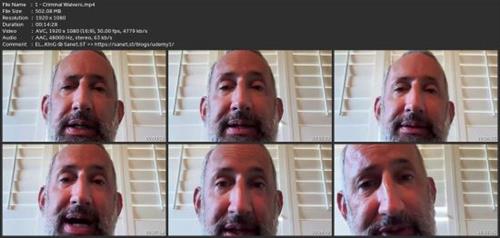- Thread Starter
- #1
Criminal Waiver Training Course Access Packet

What you'll learn
Understanding the waiver process helps individuals with criminal convictions apply for exceptions to enter or remain in the US.
It enables applicants to continue their immigration journey, such as obtaining permanent residency or non-immigrant visas.
Waivers often consider the hardship that denial of entry would cause to family members, helping families stay together.
Waivers often consider rehabilitation and the passage of time since a criminal act, allowing individuals to demonstrate personal growth.
Immigration attorneys and consultants who specialize in waivers can expand their practice, gaining a competitive edge.
Understanding Criminal Waiver process empowers individuals and professionals to navigate the system effectively, fostering inclusion and justice
Requirements
You will learn everything you need to know
Description
A US Immigration Criminal Waiver is a legal tool that allows individuals who are deemed inadmissible to the United States due to certain criminal convictions to seek permission to enter or remain in the country. Inadmissibility under immigration law can arise from various criminal offenses, including drug-related crimes, fraud, or other acts deemed serious under US immigration statutes. The waiver provides a pathway for individuals to demonstrate they are rehabilitated, meet specific legal standards, and pose no threat to public safety. If approved, the waiver enables them to overcome the barriers posed by their criminal record.Eligibility for a criminal waiver depends on the type of offense committed, the time elapsed since the offense, and the individual's overall character and circumstances. For example, certain crimes, such as aggravated felonies, may render an individual ineligible. However, in many cases, individuals can apply for a waiver if they can show that denial of their entry would result in extreme hardship to a US citizen or lawful permanent resident family member. Waivers may also be available for humanitarian reasons or significant public interest. The process often requires evidence of rehabilitation, good moral character, and supporting documentation to strengthen the case.The process begins with determining whether the applicant qualifies for a waiver under the relevant sections of the Immigration and Nationality Act (INA). Applicants must file the appropriate forms, such as Form I-601 (Application for Waiver of Grounds of Inadmissibility) or I-212 (Permission to Reapply for Admission), depending on their specific situation. Along with these forms, individuals must submit detailed evidence supporting their case, including proof of rehabilitation, letters of support from community members, and documentation showing family or humanitarian hardship. The US Citizenship and Immigration Services (USCIS) or the Department of State evaluates the application, and the decision is often discretionary.Criminal waivers play a crucial role in the US immigration system by offering individuals a second chance to rebuild their lives while upholding public safety and legal standards. For many, obtaining a waiver is a lifeline that allows them to reunite with their families, access employment opportunities, or contribute positively to their communities. This process balances fairness and accountability, ensuring that deserving individuals are not permanently barred from achieving their immigration goals due to past mistakes.
Overview
Section 1: Introduction
Lecture 1 Criminal Waivers
Lecture 2 212(h) and admitted ILLEGALLY to the U.S.
Lecture 3 The 212(h) Waiver. Got an aggravated felony? An old crime? When can you file?
Section 2: Preparing Criminal Waiver
Lecture 4 How to create a criminal waiver
Lecture 5 How to do a criminal waiver
Lecture 6 The criminal waiver and when you need it
Section 3: The Board of Immigration Appeals
Lecture 7 Judulang's Ruling in Supreme Court that BIA is arbitrary and capricious
Lecture 8 Why the Supreme Court ruled the BIA ruling in 212(c)
Lecture 9 Before new Supreme Court Case - No crime of violence for 212(c) Relief
Lecture 10 Supreme Court has spoken: BLAKE is NOT LAW. 212(c) available.
Section 4: Adjusting Status
Lecture 11 Can I adjust with an I-212 even after entering illegally ?
Section 5: Determining if a Waiver is Needed
Lecture 12 Committed a Crime, but DON'T need a Waiver. How?
Lecture 13 Got a DUI? Are you inadmissible? Need a Waiver?
Lecture 14 Rehabilitation
Section 6: Becoming a U.S. Citizen after a Waiver
Lecture 15 I got a Waiver of my crime - Now can I become a USC?
Section 7: 212(c) Waivers
Lecture 16 What is 212(c)?
Lecture 17 Why the BIA's statutory reasoning for denying 212(c) is totally flawed.
Lecture 18 212(c) crimes committed after 1996 in conjunction with crimes committed pre-1996
Section 8: The Walsh Waiver
Lecture 19 The Walsh Waiver and How to Get it.
Lecture 20 The K-1 Petition and Waiver of sex crimes against a minor
Lecture 21 Updates on the Adam Walsh Waiver - Brian D Lerner Complaints
Section 9: Waivers for Alien Smuggling
Lecture 22 How to get a Waiver for Alien Smuggling
Lecture 23 I can alien smuggle and still keep my Green Card?
Section 10: Deportation Issues regarding Waivers
Lecture 24 I've been deported. Now what?
Lecture 25 My Waiver was approved! Why won't they let me in?
Section 11: The 15 Year Waiver
Lecture 26 The Specifics of the 15 year Waiver
Law Students / Invididuals with Crime / Immigrants

Say "Thank You"
rapidgator.net:
nitroflare.com:
ddownload.com:

Published 11/2024
MP4 | Video: h264, 1920x1080 | Audio: AAC, 44.1 KHz
Language: English | Size: 6.49 GB | Duration: 3h 46m
Criminal Law, Criminal Immigration, Waiver
MP4 | Video: h264, 1920x1080 | Audio: AAC, 44.1 KHz
Language: English | Size: 6.49 GB | Duration: 3h 46m
Criminal Law, Criminal Immigration, Waiver
What you'll learn
Understanding the waiver process helps individuals with criminal convictions apply for exceptions to enter or remain in the US.
It enables applicants to continue their immigration journey, such as obtaining permanent residency or non-immigrant visas.
Waivers often consider the hardship that denial of entry would cause to family members, helping families stay together.
Waivers often consider rehabilitation and the passage of time since a criminal act, allowing individuals to demonstrate personal growth.
Immigration attorneys and consultants who specialize in waivers can expand their practice, gaining a competitive edge.
Understanding Criminal Waiver process empowers individuals and professionals to navigate the system effectively, fostering inclusion and justice
Requirements
You will learn everything you need to know
Description
A US Immigration Criminal Waiver is a legal tool that allows individuals who are deemed inadmissible to the United States due to certain criminal convictions to seek permission to enter or remain in the country. Inadmissibility under immigration law can arise from various criminal offenses, including drug-related crimes, fraud, or other acts deemed serious under US immigration statutes. The waiver provides a pathway for individuals to demonstrate they are rehabilitated, meet specific legal standards, and pose no threat to public safety. If approved, the waiver enables them to overcome the barriers posed by their criminal record.Eligibility for a criminal waiver depends on the type of offense committed, the time elapsed since the offense, and the individual's overall character and circumstances. For example, certain crimes, such as aggravated felonies, may render an individual ineligible. However, in many cases, individuals can apply for a waiver if they can show that denial of their entry would result in extreme hardship to a US citizen or lawful permanent resident family member. Waivers may also be available for humanitarian reasons or significant public interest. The process often requires evidence of rehabilitation, good moral character, and supporting documentation to strengthen the case.The process begins with determining whether the applicant qualifies for a waiver under the relevant sections of the Immigration and Nationality Act (INA). Applicants must file the appropriate forms, such as Form I-601 (Application for Waiver of Grounds of Inadmissibility) or I-212 (Permission to Reapply for Admission), depending on their specific situation. Along with these forms, individuals must submit detailed evidence supporting their case, including proof of rehabilitation, letters of support from community members, and documentation showing family or humanitarian hardship. The US Citizenship and Immigration Services (USCIS) or the Department of State evaluates the application, and the decision is often discretionary.Criminal waivers play a crucial role in the US immigration system by offering individuals a second chance to rebuild their lives while upholding public safety and legal standards. For many, obtaining a waiver is a lifeline that allows them to reunite with their families, access employment opportunities, or contribute positively to their communities. This process balances fairness and accountability, ensuring that deserving individuals are not permanently barred from achieving their immigration goals due to past mistakes.
Overview
Section 1: Introduction
Lecture 1 Criminal Waivers
Lecture 2 212(h) and admitted ILLEGALLY to the U.S.
Lecture 3 The 212(h) Waiver. Got an aggravated felony? An old crime? When can you file?
Section 2: Preparing Criminal Waiver
Lecture 4 How to create a criminal waiver
Lecture 5 How to do a criminal waiver
Lecture 6 The criminal waiver and when you need it
Section 3: The Board of Immigration Appeals
Lecture 7 Judulang's Ruling in Supreme Court that BIA is arbitrary and capricious
Lecture 8 Why the Supreme Court ruled the BIA ruling in 212(c)
Lecture 9 Before new Supreme Court Case - No crime of violence for 212(c) Relief
Lecture 10 Supreme Court has spoken: BLAKE is NOT LAW. 212(c) available.
Section 4: Adjusting Status
Lecture 11 Can I adjust with an I-212 even after entering illegally ?
Section 5: Determining if a Waiver is Needed
Lecture 12 Committed a Crime, but DON'T need a Waiver. How?
Lecture 13 Got a DUI? Are you inadmissible? Need a Waiver?
Lecture 14 Rehabilitation
Section 6: Becoming a U.S. Citizen after a Waiver
Lecture 15 I got a Waiver of my crime - Now can I become a USC?
Section 7: 212(c) Waivers
Lecture 16 What is 212(c)?
Lecture 17 Why the BIA's statutory reasoning for denying 212(c) is totally flawed.
Lecture 18 212(c) crimes committed after 1996 in conjunction with crimes committed pre-1996
Section 8: The Walsh Waiver
Lecture 19 The Walsh Waiver and How to Get it.
Lecture 20 The K-1 Petition and Waiver of sex crimes against a minor
Lecture 21 Updates on the Adam Walsh Waiver - Brian D Lerner Complaints
Section 9: Waivers for Alien Smuggling
Lecture 22 How to get a Waiver for Alien Smuggling
Lecture 23 I can alien smuggle and still keep my Green Card?
Section 10: Deportation Issues regarding Waivers
Lecture 24 I've been deported. Now what?
Lecture 25 My Waiver was approved! Why won't they let me in?
Section 11: The 15 Year Waiver
Lecture 26 The Specifics of the 15 year Waiver
Law Students / Invididuals with Crime / Immigrants
Screenshots

Say "Thank You"
rapidgator.net:
You must reply in thread to view hidden text.
nitroflare.com:
You must reply in thread to view hidden text.
ddownload.com:
You must reply in thread to view hidden text.
